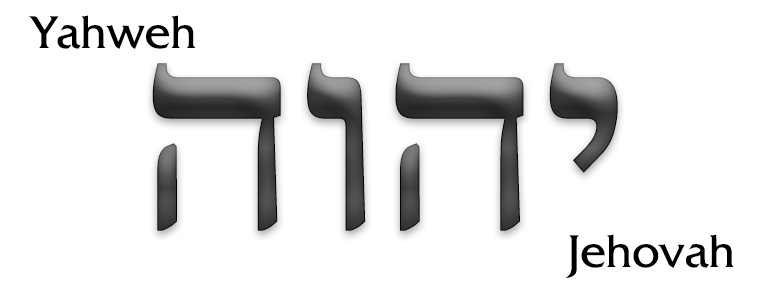
God’s Name from the Hebrew Scriptures is “Yahweh.” This name is rendered “Jehovah” in some English translations, but more often as “Lord” in others.
From the King James Version of the Bible
Genesis 22:14
And Abraham called the name of that place Jehovah-Jireh; as it is said to this day, In the mount of the Lord it shall be seen.
Exodus 6:3
And I appeared unto Abraham, unto Isaac, and unto Jacob, by the name of God Almighty, but by my name Jehovah was I not known to them.
Exodus 17:15
And Moses built an altar, and called the name of it Jehovah-Nissi.
Judges 6:24
Then Gideon built an altar there unto the Lord, and called it Jehovah-halom: unto this day it is yet in Ophrah of the Abiezrites.
Psalm 83:18
That men may know that thou, whose name alone is Jehovah, art the most high over all the earth.
Isaiah 12:2
Behold, God is my salvation; I will trust, and not be afraid: for the Lord Jehovah is my strength and my song; he also is become my salvation.
Isaiah 26:4
Trust ye in the Lord for ever: for in the Lord Jehovah is everlasting strength
The name “Jah”
“Jah” is a shortened form of Jehovah. Also “Ia” at the end of “Alleluia” (Hallelujah)
Psalm 68:4
Sing unto God, sing praises to his name: extol him that rideth upon the heavens by his name Jah, and rejoice before him.
Revelation 19:1
And after these things I heard a great voice of much people in heaven, saying, Alleluia; Salvation, and glory, and honour, and power, unto the Lord our God
Revelation 19:3
And again they said, Alleluia And her smoke rose up for ever and ever.
Revelation 19:4
And the four and twenty elders and the four beasts fell down and worshipped God that sat on the throne, saying, Amen; Alleluia.
Revelation 19:6
And I heard as it were the voice of a great multitude, and as the voice of many waters, and as the voice of mighty thunderings, saying, Alleluia: for the Lord God omnipotent reigneth.
When you read the phrase “Praise the Lord” in the Old Testament, it is usually translated from the Hebrew which literally means “Praise Jehovah.”
From the Scofield Reference Bible, we read:
(1) The primary meaning of the name LORD (Jehovah) is the “self-existent One.” Literally (as in Exodus 3:14), “He that is who He is, therefore the eternal I AM:”
But Havah, from which Jehovah, or Yahweh, is formed, signifies also “to become,” that is, to become known, thus pointing to a continuous and increasing self-revelation. Combining these meanings of Havah, we arrive at the meaning of the name Jehovah. He is “the self- existent One who reveals Himself.” The name is, in itself, an advance upon the name “God” (El, Elah, Elohim), which suggests certain attributes of Deity, as strength, etc., rather than His essential being.
(2) It is significant that the first appearance of the name Jehovah in Scripture follows the creation of man. It was God (Elohim) who said, “Let us make man in our image” (Genesis 1:26); but when man, as in the second chapter of Genesis, is to fill the scene and become dominant over creation, it is the Lord God (Jehovah Elohim) who acts. This clearly indicates a special relation of Deity, in His Jehovah character, to man, and all Scripture emphasizes this.
(3) Jehovah is distinctly the redemption name of Deity. When sin entered and redemption became necessary, it was Jehovah Elohim who sought the sinning ones Genesis 3:9-13 and clothed them with “coats of skins” Genesis 3:21 a beautiful type of righteousness provided by the Lord God through sacrifice Rom 3:21-22. The first distinct revelation of Himself by His name Jehovah was in connection with the redemption of the covenant people out of Egypt Exodus 3:13-17. As Redeemer, emphasis is laid upon those attributes of Jehovah which the sin and salvation of man bring into exercise. These are:
(a) His holiness Lev 11:44; Lev 11:45; Lev 19:1; Lev 220:26; Hab 1:12; Hab 1:13 (b) His hatred and judgment of sin ; Deuteronomy 32:35-42; Genesis 6:5-7; Psalms 11:4-6; 66:18; Exod 34:6; Exod 34:7 (c) His love for and redemption of sinners, but always righteously ; Genesis 3:21; Gen 8:20; Gen 8:21; Exod 12:12; Exod 12:13; Lev 16:2; Lev 16:3; Isa 53:5; Isa 53:6; Isa 53:10 Salvation by Jehovah apart from sacrifice is unknown to Scripture.
(4) In his redemptive relation to man, Jehovah has seven compound names which reveal Him as meeting every need of man from his lost state to the end. These compound names are:
(a) Jehovah-jireh, “the Lord will provide” Gen 22:13; Gen 22:14 i.e., will provide a sacrifice; (b) Jehovah-rapha, “the Lord that healeth” Exodus 15:26. That this refers to physical healing the context shows, but the deeper healing of soul malady is implied. (c) Jehovah-nissi, “the Lord our banner” Exodus 17:8-15. The name is interpreted by the context. The enemy was Amalek, a type of the flesh, and the conflict that day stands for the conflict of Galatians 5:17 the war of the Spirit against the flesh. Victory was wholly due to divine help. (d) Jehovah-Shalom, “the Lord our peace,” or “the Lord send peace” Judges 6:24. Almost the whole ministry of Jehovah finds expression and illustration in that chapter. Jehovah hates and judges sin Genesis 2:1-5. Jehovah loves and saves sinners Genesis 2:7-18 but only through sacrifice Genesis 2:19-21 see also ; Romans 5:1; Ephesians 2:14; Colossians 1:20. (e) Jehovah-ra-ah, “the Lord my shepherd” (Psa 23.). In Ps. 22 Jehovah makes peace by the blood of the cross; in Ps 23. Jehovah is shepherding His own who are in the world. (See Scofield “John 10:7”) (f) Jehovah-tsidkenu, “the Lord our righteousness” Jeremiah 23:6. This name of Jehovah occurs in a prophecy concerning the future restoration and conversion of Israel. Then Israel will hail him as Jehovah-tsidkenu–“the Lord our righteousness.” (g) Jehovah-shammah, “the Lord is present” Ezekiel 48:35. This name signifies Jehovah’s abiding presence with His people ; Exod 33:14; Exod 33:15; 1 Chr 16:27; 1 Chr 16:33; Psalms 16:11; 97:5; Matthew 28:20; Hebrews 13:5
(5) Lord (Jehovah) is also the distinctive name of Deity as in covenant with Israel Exodus 19:3; Exod 20:1; Exod 20:2; Jeremiah 31:31-34.
(6) Lord God (Heb. Jehovah Elohim) is the first of the compound names of Deity. Lord God is used distinctly:
(1) of the relation of Deity to man (a) as Creator Genesis 2:7-15 (b) as morally in authority over man Gen 2:16; Gen 2:17 (c) as creating and governing the earthly relationships of man ; Genesis 2:18-24; Gen 3:16-19; Gen 3:22-24 and (d) as redeeming man Gen 3:8-15; Gen 3:21
(2) of the relation of Deity to Israel Genesis 24:7; 28:13; Exod 3:15; Exod 3:18; 4:5; 5:1; 7:6; Deut 1:11; Deut 1:21; 4:1; 6:3; 12:1; Josh 7:13; Josh 7:19; Josh 7:20; Josh 10:40; Josh 10:42; Judges 2:12; 1 Samuel 2:30; 1 Kings 1:48; 2 Kings 9:6; 2 Kings 10:31; 1 Chronicles 22:19; 2 Chronicles 1:9; Ezra 1:3; Isaiah 21:17 See other names of Deity,
(See Scofield “Genesis 1:1”) See Scofield “Genesis 14:18” See Scofield “Genesis 15:2” See Scofield “Genesis 17:1” See Scofield “Genesis 21:33” See Scofield “1 Samuel 1:3”
Lord God Deity (names of God) (See Scofield “Malachi 3:18”)

